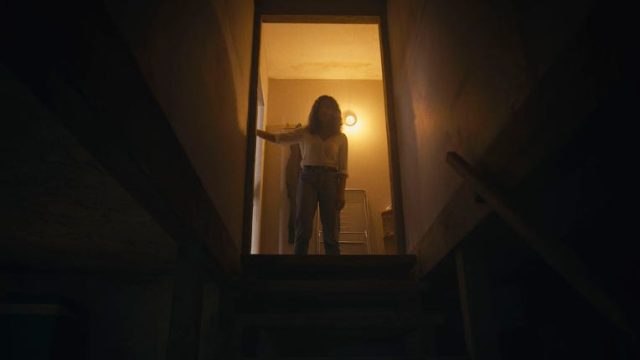Tess (Georgina Campbell) arrives at her AirBnb rental alone at midnight in the pouring rain to find the house already occupied. The overlapping renter is Keith (Bill Skarsgård), a young man about her age. Keith waffles between apologetic and annoyed, chivalrous and overstepping, and much of the early going in Barbarian is spent assessing just how much of a threat Keith represents (though lacking clown makeup, lingering effects of Skarsgård’s turn as Pennywise in the recent It movies don’t help).
Many movies that explore the ongoing awakening to ancient power dynamics between men and women seem constructed around a graduate’s thesis about the movie with the story worked backwards from there (for an extreme example from this year see Men). Barbarian has #MeToo on the brain – especially when it introduces AJ (Justin Long), an arrogant TV star spiraling after accusations of rape – but avoids didacticism by making an effort to Show, Don’t Lecture. The vague threats Tess perceives emanating from Keith have a similarity to the way Silence of the Lambs laid out the world of Clarice Starling according to the perception of the threats around her. Like that movie, Barbarian will introduce subterranean terrors in the dark, though it ultimately belongs to horror traditions other than those established by Lambs.
Along the way are other formal surprises, like when the movie appears to restart itself twice. This allows for a shifting of the dominant point of view, and it’s not always a sympathetic one. The movie is too thin to call a character study – the virtuous flip side is its 100 minutes feel even fleeter than that – but it uses the dynamics of these characters to bounce them off each other and inform the story to the bloody end. Make sure you’re seeing it on a well-calibrated screen for the full effect of cinematographer Zach Kuperstein’s darkness photography, including a cat-and-mouse sequence where the predator barely registers as a ghostly shape, provoking the eyes to desperately search shadowy frames.
Barbarian does enough right that if it comes up short of transcendence, we don’t notice until we’re being ushered out by a most disquieting use of the Ronettes’ “Be My Baby.” The movie has good sequences that evoke movies above its weight class like Lambs and The Descent – and accidentally highlights another comparison with a pointed “Nope” from Tess. Writer/Director Zach Cregger will have to enjoy distant second status as sketch comedy satirist-turned-horror auteurs go , but he demonstrates there’s plenty of room in the dank basements of the category.


